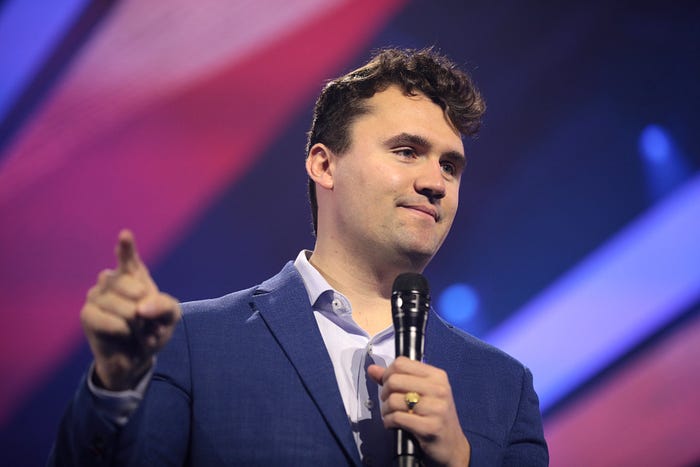And other reasons not to celebrate the murder of Charlie Kirk.

Violence Makes Voters More Conservative
“I think people have forgotten this history.” — Matt Taibbi
“There was a moment where the liberation movements of the ’60s became political violence movements,” journalist Matt Taibbi pointed out on last week’s episode of America This Week. “And that gave us a generation of Nixons and Reagans and all these figures. Freddie deBoer yesterday or the other day talked about how people still poorly understand how big that backlash was.”
“Just to quickly go through the progression, the ’60s you can really start it with the free speech movements at Berkeley or at Mario Savio,” Taibbi sketched a brief history lesson of political violence in the United States.
“Civil disobedience in the tradition of Thoreau and Gandhi, and then Martin Luther King,” Taibbi prefaced. “And it was beautiful. And then there was all this art and literature, there was Kesey, there was all this stuff, but the violence in Vietnam continued. People got frustrated, and there was this sense that, ‘We’re not going to win this thing with music and nonviolence and voting. That’s not going to get us there.’”
“And the SDS, which had been the hard edge of the protests, withered away and gave way to the Weather Underground,” Taibbi went on. “The Weather Underground, or the Weathermen as they were known, it became famous in a 1969 conference where they passed out leaflets, which said, ‘You don’t need a weatherman to know which way the wind blows.’ And that’s very similar to the things that people are saying now: ‘It’s obvious. You can see the fascism coming. You don’t need to listen to any more evidence giving.’”
“That whole vibe of, let’s just go with nature, let’s be peace, love and understanding, all that, that was what made the ’60s,” Taibbi reminded viewers. “And then, it came to an end at that moment. And people forget this, but there were 25 bombings, big, serious, deadly bombings that the Weather Underground was responsible for in the next three to four years, including of the Capitol. People talk about J6, who remembers this?”
“They bombed the State Department,” Taibbi began in grim litany. “They bombed Harvard. They bombed the California Attorney General’s office, which is ironic again. There was the Brinks robbery. They accidentally blew up a whole building in Greenwich Village.”
“There were other people, obviously,” allowed Taibbi. “There was the Jewish Defense League, who was a right-wing group. Here’s the Harvard blast from October of 1970. There was the State Department. This went all the way on until 1975, this stuff. And it had an enormous impact on American society. This was one of the reasons why we got this new hardcore form of conservatism.”
“Despite all kinds of things, including the fact that the Watergate building, that news broke during that story, Nixon wasn’t a terribly popular figure,” Taibbi continued. “He had won by a fingernail in 1968. He was widely blamed for an extremely unpopular war overseas. But a lot of it was this stuff. It was this feeling that this era of violence had gone too far. And that was an argument that Goldwater made in 1964 and was destroyed at the polls when he made it.”
“There was a speech that incidentally, I think Trump took from a lot in his first nomination speech was Goldwater’s marauder speech,” Taibbi added. “So here’s the list of people who were assassinated in the ’60s, and that preceded all the bombings. You got Medgar Evers, John Kennedy, one of the Freedom Riders, James Cheney, Malcolm X, MLK, RFK, Fred Hampton. It had the effect of moving America far, I think, to the right.”
If Taibbi is right, and he is, political violence makes voters more conservative. So, if progressives intend to grow their coalition and win elections — which they probably do — embracing, glorifying, celebrating, and above all, encouraging political violence is the wrong move.
And that isn’t the only reason to renounce political violence.
Violence Attracts the Violent
Political movements prepared to use violence attract the worst humans imaginable.
Someone who would murder another person in cold blood isn’t compromising non-violent principles for the greater good. The “Resistance” wasn’t the reason someone shot Charlie Kirk.
“The Resistance” was just the excuse. If it hadn’t been “The Resistance”, it would have been something else. Murderers don’t generally kill strangers. Most murder their own family members, friends, domestic partners, business associates, or fellow criminals, long before planning an assassination.
People who kill people don’t do so because of religious belief systems or the greater good or anything close to that. People kill people because they are murderers.
Why would you want to attract murderers to your cause?
Violence Consumes Political Movements
And destroys them.
Want to delegitimize a political movement in 10 seconds? Have one of your members engage in a gruesome, murderous act of callous indifference to human life — on video.
Political movements prepared to use violence are almost always consumed by that violence in the end.
Violence is a Wildfire
Once unleashed, the dogs of war cannot be called back.
Political movements prepared to use violence to achieve their ends always go much further than their supporters expect. Or can stomach.
The French Revolutionaries only wanted to depose the monarchy — and at first, they even promised to do so peacefully. But soon it was the aristocracy. Then the landed gentry. Then the Middle Class.
Bolshevik sympathizers in the West never expected them to murder the entire Romanov family, including the children.
But they did.
Iranians who backed the Ayatollah’s coup against the Shah never expected to spend the next decades being ruthlessly suppressed by the dictatorial regime they helped install.
But they did.
The purveyors and proponents of political violence always go too far.
Always.
(Contributing writer, Brooke Bell)